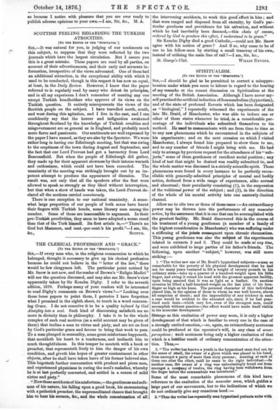SCOTTISH FEELING REGARDING THE TURKISH ATROCITIES.
[TO TEE EDITOR OF THE " SPECTATOR:I SIR,—It was natural for you, in judging of our sentiments on this subject, to suppose that they were reflected by the two journals which have the largest circulation. But I assure you this is a great mistake. These papers are read by all parties, on account of their advertisements, and their early and accurate in- formation, irrespective of the views advocated. One of them had an additional attraction, in the exceptional ability with which it used to be conducted, though in this respect it has now an equal, at least, in the Daily Review. However, I know that the paper referred to is regularly read by many who detest its principles, and in all my experience I don't remember of meeting any one except Turkish bondholders who approve of its views on the Turkish question. It entirely misrepresents the views of the Scottish people on the subject. I have travelled north, south, and west during this agitation, and I live in the east, and I can confidently say that the horror and indignation awakened throughout Scotland by the knowledge of Turkish cruelties and misgovernment are as general as in England, and probably much more fierce and passionate. Our sentiments are well expressed by the paper I have named, as they are also by the Spectator. We were rather long in having our Edinburgh meeting, but that was owing to the emptiness of the town during August and September, and the fact that our Lord Provost had got a baronetcy from Lord Beaconsfield. But when the people of Edinburgh did gather, they made up for their apparent slowness by their intense warmth and enthusiasm, which could not have been exceeded. The unanimity of the meeting was strikingly brought out by an im- potent attempt to produce the appearance of disunion. The result was, not only that all the speakers after the first were allowed to speak as strongly as they liked without interruption, but that when a show of hands was taken, the Lord-Provost de- clared all the motions carried unanimously.
There is one exception to our national unanimity. A some- what large proportion of our people of both sexes have burnt their fingers with Turkish bonds, some literary men among the number. Some of these are inaccessible to argument. In their pro-Turkish proclivities, they seem to have adopted a worse creed than that of the Turk himself. Its first article is,—" There's no God but Mammon, and cent.-per-cent.'s his profit."—.I am, Sir, SCOTUS.


































 Previous page
Previous page